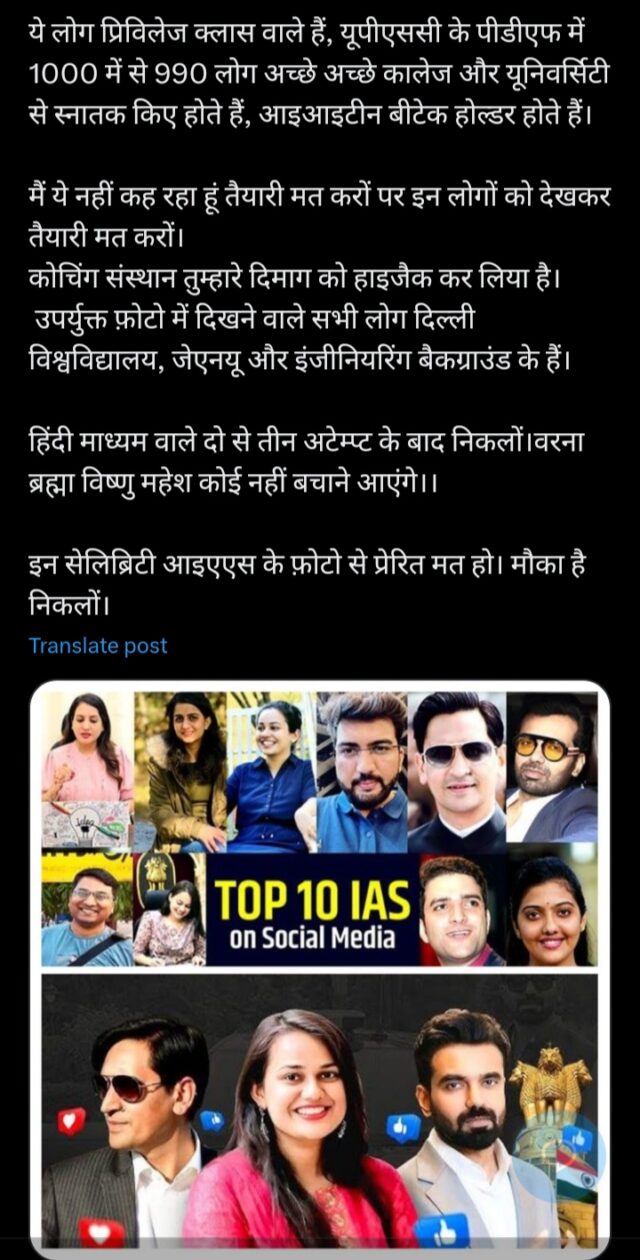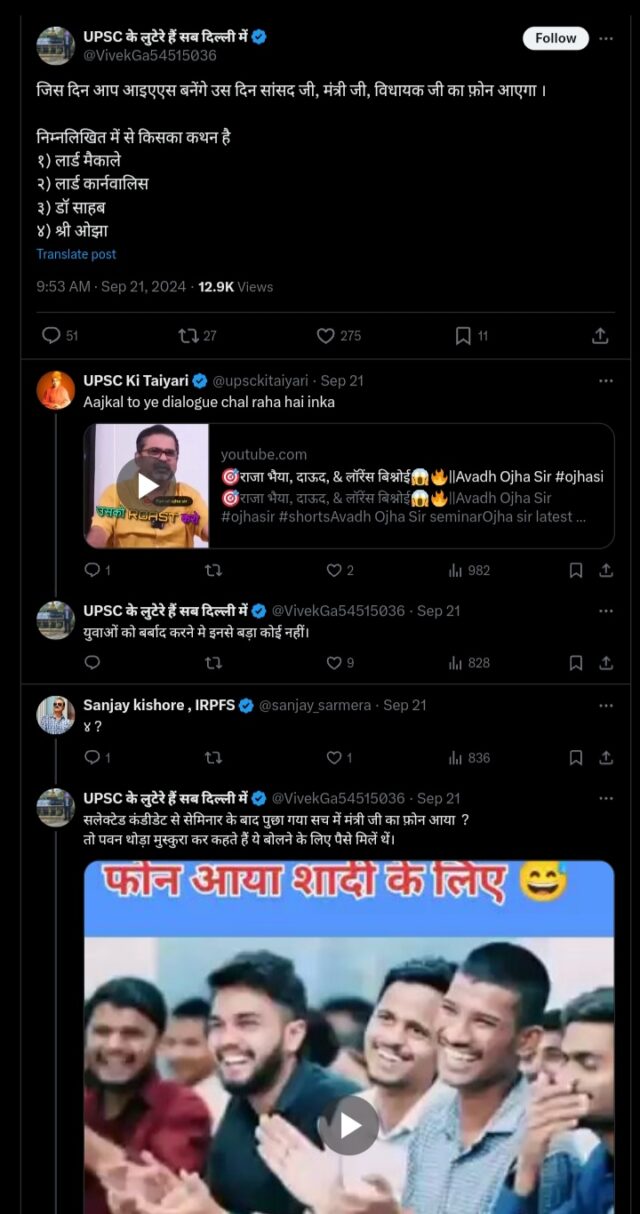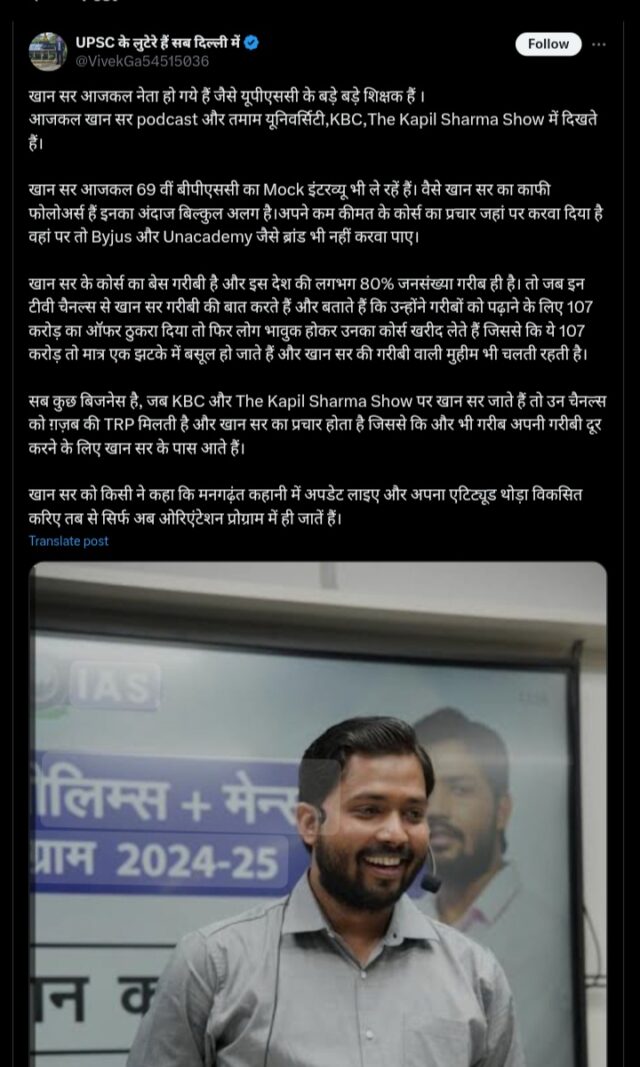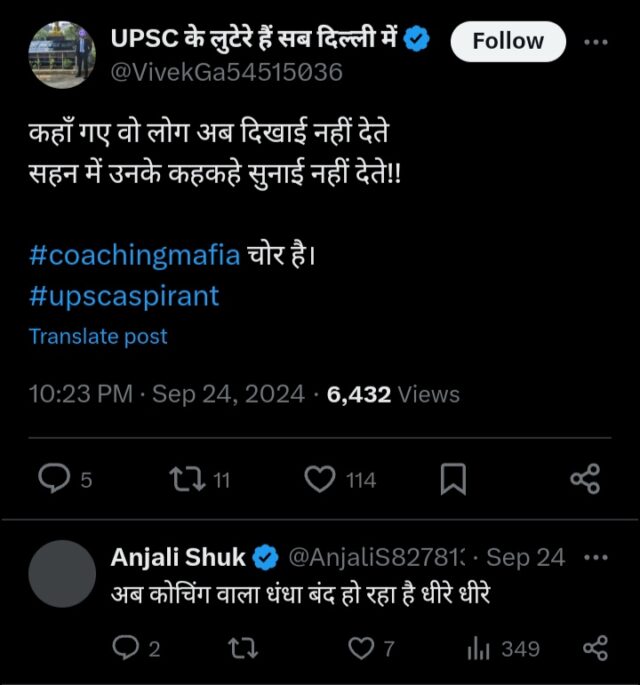In the heart of Delhi’s Mukherjee Nagar, the bustling hub for UPSC coaching institutes, a 25-year-old anonymous figure has emerged as an unexpected voice of dissent. Hailing from Jharkhand, this UPSC aspirant has taken on a unique role.
After four unsuccessful attempts at cracking the coveted exam, he has become a whistleblower, using his X handle “‘UPSC ke lootere hain sab Dilli me’ (@VivekGa54515036)” to expose what he calls the “UPSC coaching mafia” of Delhi. This anonymous user is shaking up the civil services preparation ecosystem.
Despite the boldness of his actions, it’s important to ask: does his activism stem from a desire for reform, or is it fueled by personal frustration?
False Dreams and Exploitation
The whistleblower, through his social media handle, accuses the coaching industry of selling false dreams to aspiring civil servants. According to him, these institutes promise success but treat students as “mere customers”.
In a series of tweets, he criticizes teachers for feeding aspirants with “fake motivation” and paints a grim picture of a system that exploits vulnerable youth. He even blames selected IAS officers for adding to the deception by glamorizing their achievements on social media.
For instance, after the tragic drowning of three aspirants in Old Rajinder Nagar, the whistleblower’s account became a rallying point for student outrage. A tweet about the incident – “मां ने बात ही किया था मम्मी लाइब्रेरी में हूं पढ़ रहा हूं 12 बजे तक रूम पर जाउंगा। मां को 10 बजे ही फ़ोन गया son is no more, कोचिंग माफिया तजुर्बा दे रहीं हैं” reached over 7 lakh people, stirring further conversations about the harsh realities of being a UPSC aspirant.
His posts don’t shy away from facts, often presenting data from official sources like LBSNAA to highlight the steep decline in success rates especially of Hindi-medium aspirants, whose success rate hovers at a dismal 2-3%. “No one tells you to quit. They want you to keep paying. They’ll keep giving you false hope,” he argues, particularly targeting vulnerable students from states like Bihar and Uttar Pradesh.
Despite this, one cannot help but notice that his criticisms also reflect his dissatisfaction. The failure to secure a UPSC rank appears to have transformed his ambition into anger. His disillusionment may be justified, but is his activism about genuine change, or is it just a venting mechanism?
The Whistleblower’s Anger
While many students admire the whistleblower’s boldness, some suspect that his anger stems from personal failure rather than a desire for meaningful change. The coaching industry has long been criticized for its predatory tactics. Still, the whistleblower’s specific attacks on individuals, including popular educators like Vikas Divyakirti, and Avadh Ojha and selected candidates like Tina Dabi, seem more personal than constructive.
He once tweeted an image of five doctors who became IAS officers, questioning why they left their high-paying medical careers. A user’s comment under the tweet – “If everyone starts getting this inspiration, no doctor or engineer will be left“- received nearly 100 reposts, but it raises the question: Is his issue with the system, or with the fact that others succeeded where he did not?
Similarly, when he calls out coaching institutes for their exorbitant fees and lack of support, his anger is palpable. But does he offer any solutions? So far, his posts have focused on exposing problems without presenting clear alternatives.
Read More: UPSC Might Leave The Dreams Of Many Shattered But There’s Always A Way Out
The whistleblower is also navigating the fine line between whistleblowing and becoming part of the same influencer ecosystem he critiques. His X account has gained over 21,000 followers, and he admits to receiving defamation suits, threats, and even bribe offers. Yet, he continues to expose the “lootere” (looters) of Delhi’s coaching industry. Is this activism out of frustration or a desire to see real reform in the UPSC system?
But not everyone is buying his story. To some, his posts are just the angry rants of a bitter failure. “He’s just lashing out because he couldn’t make it,” says a senior UPSC teacher, dismissing his critique as sour grapes.
Others accuse him of playing the victim. “He’s spent years chasing the UPSC dream, and now he’s turning his frustration on the system. It’s not about reform for him; it’s personal,” says another educator. Some even suggest his failure has clouded his judgment, leading him to lash out at the very people who might have succeeded where he couldn’t.
The personal nature of his attacks has also raised eyebrows. “He names people, calls them out directly. It’s not activism- it’s a vendetta,” says a current UPSC candidate, adding that his posts often feel more like public outbursts than well-thought-out arguments.
“It’s easier to blame others than reflect on your own shortcomings,” a successful aspirant remarked, suggesting that the whistleblower’s own failure may have fueled his rage.
Is He A Hero?
What stands out in the whistleblower’s narrative is his complex relationship with the UPSC system. Despite calling out its flaws, he remains deeply entrenched in it. His failure to crack the exam three times and his near-miss in two Bihar Public Service exams have only intensified his disdain for the system. He is angry, not just at the coaching institutes, but also at the government for allowing aspirants to waste years chasing a dream that only a handful will ever achieve.
In one interview, he suggested that the government should reduce the age limit for UPSC aspirants from 32 to 26 and limit the number of attempts to three. According to him, “If you can’t crack it in three years, you should quit.”
Yet, he is preparing for his final attempt. His criticism of the system he’s still a part of reveals a deeper yearning- despite all his rage, he is not quite ready to let go of the IAS dream.
His posts, filled with sharp insights and biting sarcasm, speak to the harsh truths of the UPSC grind, but they also mirror his frustration. As he advises students to avoid the “prelims-mains-rinse-repeat” cycle, he, too, is trapped in it. Perhaps his activism is as much about giving himself closure as it is about exposing the reality of the UPSC ecosystem.
The Mukherjee Nagar whistleblower has become a symbol of disillusionment for many UPSC aspirants, especially those from Hindi-medium backgrounds who feel sidelined in the race. His X handle has amplified their grievances, sparking important conversations about mental health, exploitation, and the commercialization of education.
Yet, his journey raises another question: Can meaningful change come from a place of anger alone? Or is his activism destined to fizzle out once his UPSC dreams fade away?
While his posts are indeed eye-openers, they also reflect his internal battle between aspiration and resentment. His story, however, offers a valuable lesson for many – don’t let ambition blind you to the realities of life but don’t let frustration be your only fuel for change.
Whether he will continue as an anonymous truth-teller or eventually leave the UPSC world behind remains to be seen, but for now, his voice has shaken the foundations of Mukherjee Nagar’s coaching empire.
Sources: The Print, Economic Times, Hindustan Times
This post is tagged under: #UPSC, Exam, UPSC Journey, Mukherjee Nagar, UPSC Preparation, Whistleblower, UPSC Reality, Coaching Scam, UPSC Struggles, Hindi Medium Aspirants, Civil Services, IAS Dream, UPSC Motivation, UPSC Exposed, UPSC Journey Unfiltered, UPSC Ke Lootere, Vikas Divyakirti, Avadh Ojha, Coaching, Business, Industry
Disclaimer: We do not hold any right, or copyright over any of the images used, these have been taken from Google. In case of credits or removal, the owner may kindly mail us.







































